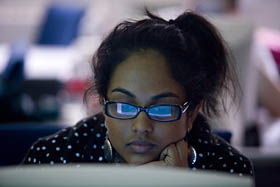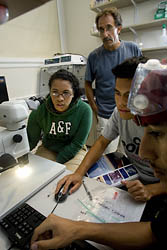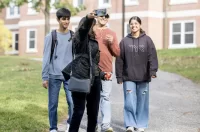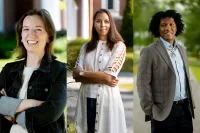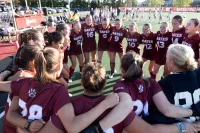
Hughes program boosts students' math, science prospects
Students at Bates College this summer explored crime-scene chemistry and cultural diversity in mathematics through a program designed to make math and science more inviting to groups underrepresented in those fields.
Eleven members of the class of 2011 from as near as Portland and as far away as California got an early start on their Bates careers through the inaugural Hughes Summer Scholars Program. Funded by the Howard Hughes Medical Institute, the program is designed to encourage a wider range of students to study science and math, and to stick with those disciplines.
In addition to providing an accelerated introduction to college-level studies, the program encourages participants to form intellectual and social bonds with each other, with other science and math students, and with faculty and staff.
The participants, who will return to Bates in September for the start of regular classes, took two courses — each the equivalent of a regular semester course — for full credit during the program, which ran June 24-Aug. 3. They lived together in student housing with two upperclass Bates students, spending long days on academic work and breaking for recreational activities such as the Yarmouth Clam Festival on weekends.
“Academically, it’s been incredibly rigorous,” said Tom Wenzel, the program’s director and Charles A. Dana Professor of Chemistry at Bates. “Their schedule, in terms of hours that they’re working per week, was far heavier than a student would have during the regular semester. This intensity has gotten them prepped for working at a high level.”
As Wenzel points out, “it’s very important to realize that this isn’t in any way a remedial program.” The Hughes Summer Scholars were selected from students that Bates, known for its high admissions standards, had already accepted.
“These are all excellent students,” Wenzel explains. “We’re just trying to give them an earlier start to make them better-prepared to succeed in the fall.”
The program introduced participants to the ways of Bates without the social pressure of having the full student body around, but with the moral support of their fellow Hughes Scholars and a closely attentive group of staff, faculty and upperclass students.
“That’s one of the big advantages of the program, the fact that we’ve been able to become so familiar with the staff and the school itself,” said Davina Dukuly of Lowell, Mass. “I expected it to be like the first day of school — you’re just there and have to fend for yourself. But I’ve seen that Bates isn’t like that.”
“We really emphasized the idea of forming study groups, comparing notes from classes, things like that,” Wenzel said. “So the hope is that they won’t have a tendency to become isolated in the fall — they’ll already have this social network.”
“In high school, I used to get really frustrated because I’d be at home alone trying to figure everything out,” said Dukuly. “But with the 11 of us, we’re all doing the same thing and we can work in groups. It’s been really helpful.”
Wenzel taught the first-year seminar “Forensic Chemistry,” which uses the popularity of CSI-style television programs as an entrée to the study of fundamental concepts in chemistry. Combining classroom instruction and laboratory work performed on Bates’ state-of-the-art analytical equipment, the students examined and reported on lifelike clues to fictitious crimes — such as a murder whose investigation entailed the analysis of DNA on a cigarette butt.
Grace Coulombe, director of the college’s Mathematics and Statistics Workshop, taught the course “Mathematics Across Time and Cultures.” The course used activities and practices from other cultures — for example, kin relations — as a means to explore contemporary mathematical topics.
Bates and the Howard Hughes Medical Institute, a longtime funding partner of the college, share an interest in promoting wider participation in the sciences. The new initiative resembles a six-week program at the University of Maryland, Baltimore County.
“Programs like this might be fairly common, but many of them are far shorter,” Wenzel explained. “The idea of having students come early, spend six weeks and take two courses for credit that actually count on their transcripts is rather uncommon.”
He adds, “They’ve been just an amazing, fun group of students. Here in the heat of the summer, with six hours of class and lab a day plus homework, and still this group has just been energized, enthusiastic.”
“It is the summer, and cramming a semester of math and chem into six weeks would make any 17-year-old go crazy — giving up your summer before college,” said Shameena Khan, a Hughes Summer Scholar from the Bronx, N.Y. “But it was worth it in the end.”
